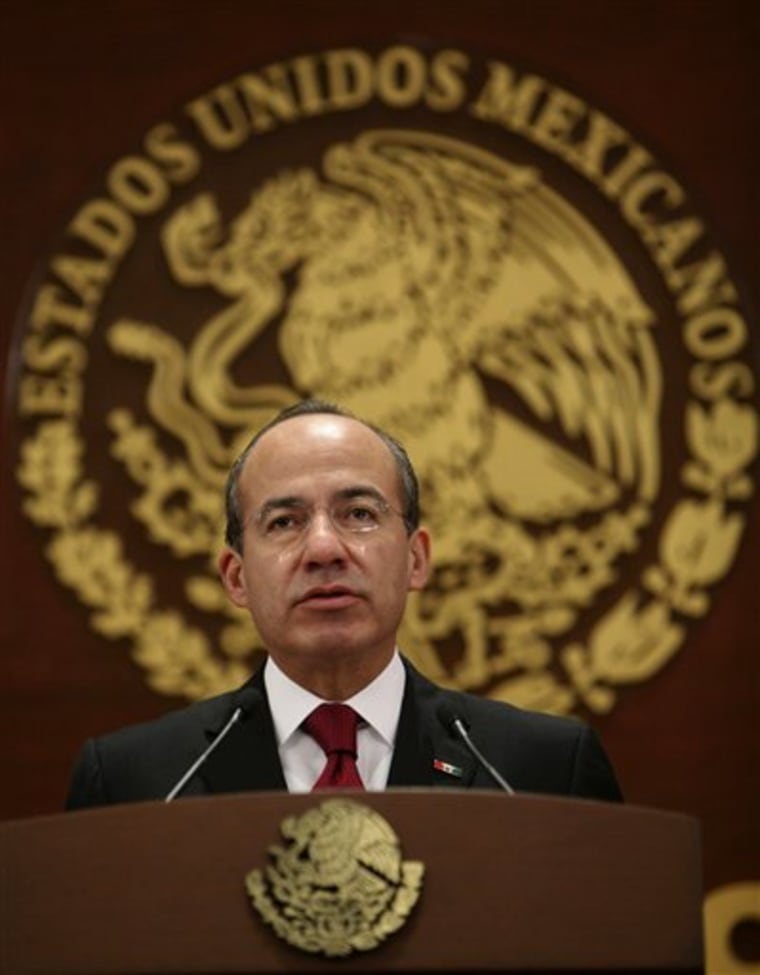President Felipe Calderon is proposing runoff elections in future presidential contests and re-election for many officials in Mexico's most dramatic political reform attempt in decades.
The proposal announced Tuesday would still limit presidents to a single, six-year term, but it would relax Mexico's ironclad ban on re-election of other officials. It also would allow independent candidates to run for public offices and would permit citizen initiatives.
"The idea is to give citizens more power, to give them the capacity to shape public life and to strengthen our democracy," Calderon said in a televised address.
But reforms would require a string of tough-to-pass constitutional amendments and they are likely to come under fire from established parties who could see their power eroded by the changes.
Under the proposed reform, the winner of presidential elections would have to receive more than half of the votes to avoid a runoff with the next-highest vote getter.
A stronger mandate?
That might have averted some of the struggles that Calderon faced when he won the 2006 election with just 36 percent of the vote — less than a percentage point ahead of leftist rival Andres Manuel Lopez Obrador, whose claims of fraud led to weeks of disruptive protests.
Many of Lopez Obrador's backers in the Democratic Revolutionary Party, or PRD, still refuse to accept Calderon as legitimate president.
Calderon said a runoff election would give the winner a stronger mandate: "It will be guaranteed that whoever has the biggest support will win," he said.
Calderon also proposed reducing the number of senators from 128 to 96 and congressmen from 500 to 400 as a way to cut government spending and "to facilitate the building of accords."
Lawmakers and mayors could hold office for up to 12 years through re-election, making them more accountable, Calderon said.
"The public officials who want to remain in their posts will have to show their work and be accountable to voters who will then punish them or praise them with their votes," he said.
Analysts said Calderon will have a difficult time getting the reform through Congress in a country still leery of letting politicians hold onto office after 71 years of rule by the Institutional Revolutionary Party, or PRI, which held power until 2000 and still has many governorships.
"You see the public opinion polls on politicians and the last thing that the people want is for them to stay in office an extra term or two," said George Grayson, a Mexico expert at the College of William & Mary in Virginia.
Less control by party bosses
Allowing re-election of lawmakers and mayors would give party bosses less control over politicians' futures while letting independent candidates run would erode parties' control over elections.
And Calderon's plan to make small parties get at least 4 percent of the vote to qualify for lucrative public funding — up from 2 percent now — will rouse opposition from those factions.
"The PRI can usually muster more votes than any other party and the PRD had an exceptional year in 2006, but it's not going to get into the position of raising above a third of the vote, as Lopez Obrador did," Grayson said. "It's just not in the interest of the PRI and the PRD to change how you elect the president."
The PRI's congressional leader, Francisco Rojas, told the newspaper El Universal that political reforms will go to the back burner because tax and economic reforms are more urgent.
PRD Senator Pablo Gomez said the only proposal worth passing is the independent candidacies.
"I'm sorry to say I don't agree with any of the other points," Gomez said.
Ahead of his time?
Many reformers have proposed limited re-election, but the concept runs against a near-sacred principle of the country's democracy, one created to prevent the re-emergence of the national strongmen and regional bosses who long dominated the country.
Many official documents and letters still bear the Mexican revolutionary slogan: "Effective suffrage. No re-election."
Calderon apparently is not interested in lifting presidential term limits like other Latin American countries. Colombia and Venezuela have recently passed laws allowing for presidents to serve consecutive terms. But in Honduras, President Manuel Zelaya's opponents defended his June 28 ouster by arguing he intended to lift presidential term limits.
"It's a commendable act in civic progress ... but I'm afraid he's perhaps ahead of his time," Grayson said.
